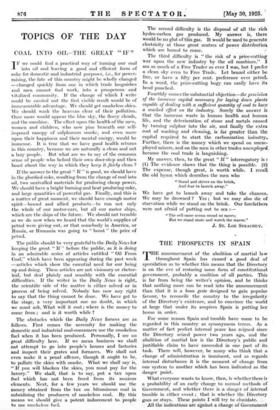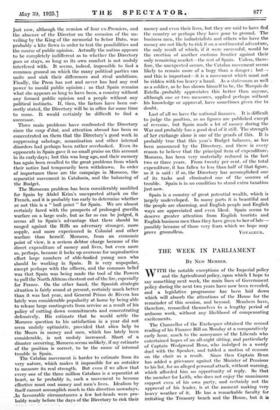THE PROSPECTS IN SPAIN
THE announcement of the abolition of martial law throughout Spain has caused a good deal of speculation as to whether this means that the Directory is on the eve of restoring some form of constitutional government, probably a coalition of all parties. This is far from being the writer's opinion, and he thinks that nothing more can be read into the announcement than that it is a beau genie designed to gain popular favour, • to reconcile the country to the irregularity of the Directory's existence, and to convince the world at large that under its auspices Spain is putting her house in order.
For some reason Spain and trouble have come to be regarded in this country as synonymous terms. As a matter of fact perfect internal peace has reigned since the Directory seized power two years ago, and the abolition of martial law is the Directory's public and justifiable claim to have succeeded in one part of its task. There will, however, be many who think that a change of administration is imminent, and as regards internal disturbance it is the moment of change from one 'system to another which has been indicated as the danger point.
What everyone wants to know, then, is whether there is a probability of an early change to normal methods of Government, and whether there is a danger of internal trouble in either event ; that is whether the Directory goes or, stays. These points I will try to elucidate.
All the indications are against a change of Government just now, although the reunion of four ex-Premiers, and the absence of the Director on the occasion of the un- veiling by the King of the memorial to Senor Dato, was probably a kite flown in order to test the possibilities and the course of public opinion. Actually the nation appears to be completely indifferent as to whether the Directory goes or stays, so long as its own comfort is not unduly interfered with. It seems, indeed, impossible to find a common ground on which the many political parties can unite and sink their differences and rival ambitions. Finally, the Press has not and never has had any real power to mould public opinion ; so that Spain remains what she appears so long to have been, a country without any formed public opinion and a people without any political instincts. If, then, the factors have been cor- rectly stated, the Directory will be in office for some time to come. It would certainly be difficult to find a successor.
Three main problems have confronted the Directory since the coup d'eiut, and attention abroad has been so concentrated on them that the Directory's good work in suppressing sabotage, assassination and other internal disorders had perhaps been rather overlooked. Even its opponents in Spain gave it no small praise on this account in its early days; but this was long ago, and their memory has again been recalled to the great problems from which their notice had temporarily been withdrawn. In order of importance these are the campaign in Morocco, the separatist movement in Catalonia, and the balancing of the Budget.
The Moroccan problem has been considerably modified for Spain by Abdel Krim's unexpected attack on the French, and it is probably too early to determine whether or not this is a " bull point " for Spain. We are almost certainly faced with the prospects of prolonged guerilla warfare on a large scale, but as far as can be judged, it seems all to Spain's advantage that there should be ranged against the Riffs an adversary stronger, more supple, and more experienced in Colonial and other warfare than herself. Morocco, from an economic point of view, is a serious debtor charge because of the direct expenditure of money and lives, but even more so, perhaps, because it locks up overseas for unproductive effort large numbers of able-bodied young men who should be working in Spain. It is very unpopular, except perhaps with the officers, and the common belief was that Spain was being made the tool of the Powers to pull the North African chestnut out of the fire, especially for France. On the other hand, the Spanish strategic situation is fairly sound at present, certainly much better than it was last year, and General Primo de Rivera has lately won considerable popularity at home by being able to release large contingents from service as a result of his policy of cutting down commitments and concentrating defensively. His estimate that he would settle the Morocco question to his satisfaction in a year did not seem unduly optimistic, provided that alien help to the Mocirs in money and men, which has lately been considerable, is not unduly increased. Short of a disaster occurring, Morocco seems unlikely, if my estimate of the pOsition is correct, to be the cause of internal trouble in Spain. The Catalan movement is harder to estimate from its very nature, which makes it impossible for an outsider to measure its real strength. But even if we allow that every one of the three million Catalans is a separatist at heart, as he probably is, such a movement to become effective must cost money and men's lives. Idealism by itself cannot accomplish much in this direction nowadays. ,In favourable circumstances a few hot-heads were pro- bably ready before the days of the Directory to risk their money and even their lives, but they are said to have fled the country or perhaps they have gone to ground. The business men, the industrialists and others who have the money are not likely to risk it on a sentimental adventure, the only result of which, if it were successful, would be the erection of another customs frontier against their only remaining market—the rest of Spain. Unless, there- fore, the unexpected occurs, the Catalan movement seems likely to remain more of a bogy than a danger ; but— and this is important—it is a movement which must not be ridden with too heavy a hand. As a statesman as well as a soldier, as he has shown himself to be, the Marquis de Estella . probably appreciates this better than anyone, although one or two measures, applied perhaps without his knowledge or approval, have sometimes given rise to doubt.
Last of all we have the national finances. It is difficult to judge the position, as no figures are published except of revenue, but Spain made a lot of money during the War and probably has a good deal of it still. The strength of her exchange alone is one of the proofs of this. It is probably true that this year's Budget balances, as has been announced by the Directory, and there is every reason to believe that the principal item of expenditure, Morocco, has been very materially reduced in the last two or three years. From twenty per cent. of the total expenditure, it has fallen to less than half of that figure, so it is said : if so, the Directory has accomplished one of its tasks and eliminated one of the sources of trouble. Spain is in no condition to stand extra taxation just now.
Spain is a country of great potential wealth, which is largely undeveloped. In many parts it is beautiful and the people are charming, and English people and English ways are appreciated and even liked. Spain seems to deserve greater attention from English tourists and English business men than they have given to her of late— possibly because of those very fears which we hope may











































 Previous page
Previous page